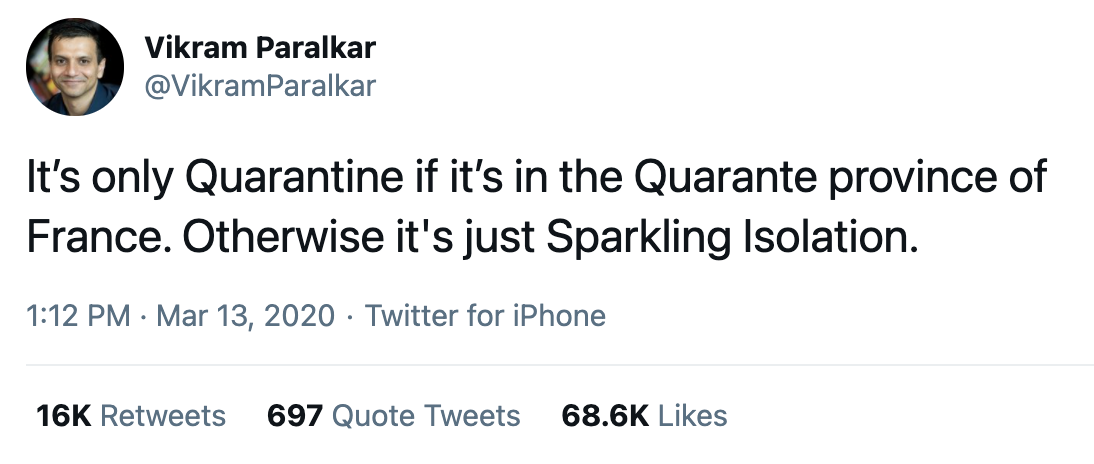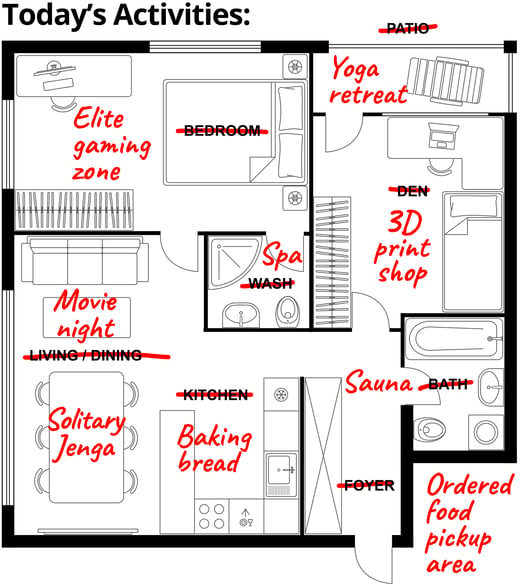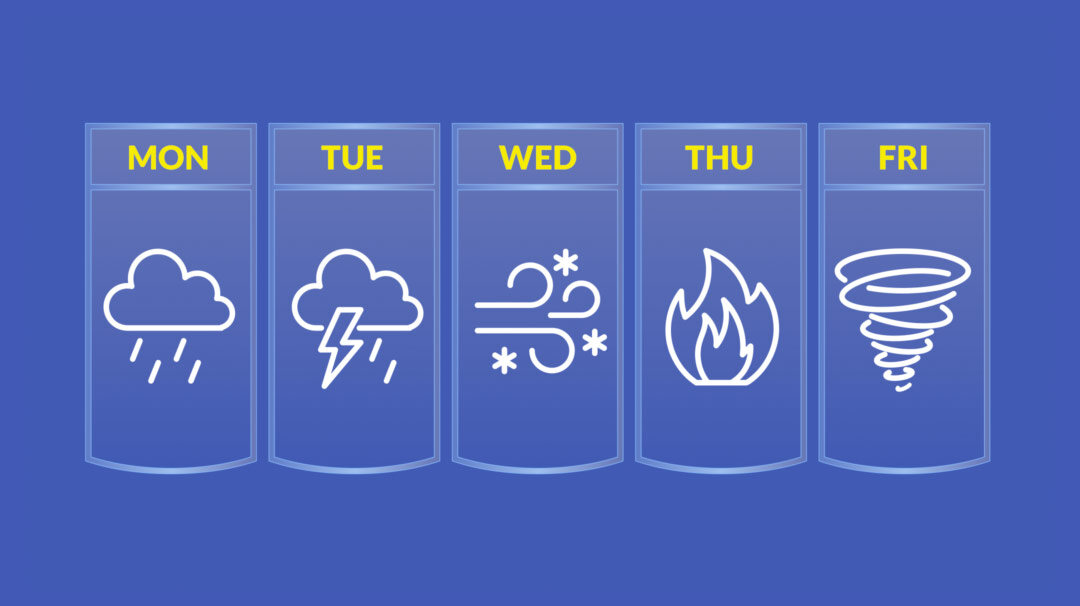COVID-19 got you Down? 6 Ways to Fight Pandemic Fatigue and Stay Positive
by Samantha on Feb 12, 2021 7:54:47 AM

What do you miss most from before the pandemic? I miss getting coffee with friends. You know, sitting back in those comfy café chairs, watching and listening to people milling about in the moment and savouring that sweet dark roast aroma in the air. All while catching up in person, face-to-face, talking about anything and everything not related to COVID.
Now, staying at home, avoiding people, and binging Netflix all day every day seems to be the new normal – at least for the time being. Turning our homes into office spaces, teaching spaces and virtual meet-up places has perhaps altered the definition of in-real-life for an entire generation. 2020 was a year full of unexpected surprises and interruptions to all the things that we love most. And while 2021 seems to be off to a pandemic start, there’s finally some hope, and perhaps an end in sight!
In the meantime, how can we stay positive and keep on going?
When we are faced with difficult times, intense emotions, and heightened anxiety, we can quickly be overwhelmed, which can turn into Pandemic Fatigue. According to the World Health Organization, Pandemic Fatigue occurs after enduring a health crisis for a long period of time and can result in demotivation, as well as feelings of helplessness, sadness, worry, frustration, and irritability brought on by our new normal. If you’re experiencing these feelings right now, then you’re not alone. A recent study found that 41% of us are suffering from heightened anxiety, especially ‘next-day anxiety’ – the fear of tomorrow’s uncertainties.
These are troubling times and it’s important that we learn to protect our mental health in order to get through the tail-end of this pandemic. You can find a happy place, so long as you have the right headspace.

1. Limit your social media time
Lately, it seems like every day something terrible and emotionally draining is splattered across my news feed, and for some reason, I’m constantly checking my phone for new updates.
While it is important to stay informed, experts like Karen H. Ho says it’s fine to tune out of social media once and a while, especially in matters that you cannot control, since constant updates can leave you feeling extremely anxious.
Keep in mind that the media loves to focus on negative news stories because we’re wired to keep reading. This is called doom scrolling, and to keep yourself from scrolling to oblivion, it is suggested that you limit your social media intake to no more than twice a day and unplug from the news at least an hour before bed.
2. Take care of your body
Your mental and physical health are deeply intertwined, so it is important to maintain both, even though restrictions may result in you spending more time indoors. Giuseppe Musumeci and Silvia Ravalli from the University of Catania tell us that a sedentary lifestyle can cause long-term harm to our bodies and that we should seek out activity wherever we can find it.
“Opportunities can be seen everywhere;” Musumeci and Ravalli say, “for those who are working from home, for example, the daily commute can be translated in time dedicated to starting the day with stretching and soft strengthening exercises or yoga sessions. Low, medium, and high-intensity exercises can also be performed in small rooms, with the help of technologies such as videos and apps that can be freely found on the web or downloaded directly onto a smartphone.”
Personally, I enjoy biking whenever weather permits, and ice skating in our winter months. I find these activities most rewarding, as they give me the chance to get outside, unwind and exercise, all while keeping my distance from others. I also make it a point to ensure my sleep schedules are as consistent as possible – a good night’s rest helps with next-day anxiety.
It’s the little things that create structure and improve our moods. If our bodies are in a balanced and healthy state, then our minds will feel much improved as well.
3. Focus on what you can control
Everyone has at least one thing they miss from normal times: movie theatres, gyms, hugs… but with the pandemic, all of these things have come to a screeching halt. In their place has come waves of emotionally taxing ‘what-ifs’ and worst-case scenarios that can keep you up at night. Everyone has a different level of tolerance for uncertainty and it’s OK if you have reached yours.
Lawrence Robinson and Melinda Smith from Helpguide.org say that worrying is one such way we like to deal with uncertainty. Worrying gives us a feeling of control because if you agonize over a problem long enough, perhaps you’ll find a solution. They go on to say that when it comes to things outside of your control, obsessing over negative scenarios will only sap you of energy. Instead, try focusing on the present and what you can control.
For instance, social distancing, wearing a mask, and washing your hands can help relieve feelings of helplessness and will help you feel safer when you have to interact with other people. Keep in mind that you have control over your own actions. You can avoid places that are too crowded, and you can bring those movies, exercise, and hugs home.

4. Maintain your relationships
Extroverts everywhere are feeling the pain of the pandemic, but just because we’re socially distancing, it doesn’t mean that we can’t be social. Isolation is detrimental to our health, so staying in contact with the people we love, through messaging, social media or a simple phone call is beneficial.
On the flip side of isolation, families and people living close together have had to deal with a lot of ‘togetherness’. Overall, studies have found that people who are cohabitating have had less anxiety and depression, compared to people who live alone. But the quality of those relationships is an important factor in ensuring everyone in the household is happy. If your living situation is tense, Dr. Laurie Santos from Yale University says that it is important to try and remember what made your relationships work in the past and play to those strengths.
Are you great at spontaneously thoughtful gestures? Are you really good at communication? Do you know how to make each other laugh? Whatever it is that made your family work before, double down on it now, while still being respectful of boundaries and environments.
5. Try something new
It’s normal to feel overwhelmed, and getting into a routine of doing mind-stimulating activities that bring joy can be the answer. Here are a few ideas:
- Try Yoga
- Close your eyes and meditate
- Write a journal
- Watch a funny movie
- Go for a long walk
- Roll up your sleeves and make something crafty
- Paint a picture
- Break out your controllers and play video games long into the night
- Listen to music that you normally wouldn’t listen to
- Learn how to dance
- Learn something new online
There are plenty of ways you can keep busy and reward your mind at the same time. Personally, I love playing video games online with friends, as a way to channel my energy into the mutual goal of defeating the enemy!
6. Take a meaningful break
Since the start of the pandemic, your home has been repurposed to accommodate your entire existence; it’s now an office, a school, a daycare, a movie theatre, and a gym, all rolled into one. And after following this guide, you’ll be even busier than ever before.
So, don’t forget to take a break! Take a deep breath and recharge. Have a coffee in real life and invite your friends along, virtually. You probably need the practice, because it’s been so long! We’ll be sitting back in those really cozy café chairs, watching people mill about, in real life, really soon.
It may be difficult to imagine at the moment, but things will get better. Years from now we’ll look back on the craziness of the 2020s as a challenge that we successfully faced and conquered. Life may feel messy, uncontrollable and lonely right now, but the key is to get in sync with the people around us, our environments, and most importantly, ourselves.
- September 2025 (3)
- August 2025 (1)
- July 2025 (3)
- June 2025 (1)
- May 2025 (1)
- April 2025 (1)
- February 2025 (2)
- January 2025 (1)
- December 2024 (1)
- November 2024 (2)
- October 2024 (5)
- September 2024 (6)
- August 2024 (3)
- July 2024 (6)
- June 2024 (4)
- May 2024 (4)
- April 2024 (7)
- March 2024 (4)
- February 2024 (5)
- January 2024 (5)
- December 2023 (1)
- November 2023 (3)
- October 2023 (3)
- September 2023 (2)
- August 2023 (5)
- July 2023 (2)
- June 2023 (4)
- May 2023 (2)
- March 2023 (2)
- February 2023 (1)
- January 2023 (3)
- December 2022 (1)
- November 2022 (3)
- October 2022 (2)
- August 2022 (3)
- July 2022 (1)
- June 2022 (1)
- May 2022 (2)
- April 2022 (1)
- March 2022 (2)
- January 2022 (4)
- December 2021 (2)
- October 2021 (3)
- September 2021 (3)
- August 2021 (1)
- July 2021 (5)
- June 2021 (4)
- May 2021 (3)
- April 2021 (4)
- March 2021 (5)
- February 2021 (2)
- January 2021 (5)
- December 2020 (1)
- November 2020 (2)
- September 2020 (1)
- August 2020 (1)
- July 2020 (1)
- May 2020 (1)
- April 2020 (1)
- March 2020 (3)
- February 2020 (1)
- November 2019 (1)
- October 2019 (1)
- August 2019 (1)
- May 2019 (1)
- April 2019 (1)
- February 2019 (1)
- January 2019 (2)
- December 2018 (1)
- October 2018 (2)
- September 2018 (4)
- June 2018 (1)
- May 2018 (1)
- March 2018 (1)
- January 2018 (2)
- December 2017 (2)
- November 2017 (2)
- September 2017 (1)
- August 2017 (2)
- May 2017 (2)
- April 2017 (1)
- January 2017 (2)
- July 2016 (3)
- June 2016 (3)
- February 2016 (1)
- November 2015 (1)
- September 2015 (1)
- August 2015 (4)
- May 2015 (4)
- January 2015 (2)
- October 2014 (1)
- September 2014 (1)
- August 2014 (2)
- July 2014 (5)
- June 2014 (2)
- March 2014 (1)
- December 2013 (1)
- October 2013 (1)
- September 2013 (1)
- July 2013 (4)
- June 2013 (2)
- April 2013 (1)
- February 2013 (1)
- January 2013 (1)
Subscribe by email
You May Also Like
These Related Articles

Freedom worth protecting

The Mobile App Update You’ve Been Waiting for is Here!
